At the end of December 2023, U4E supported a Regional Energy Efficiency Policy Workshop in Algiers organised with the African Union African Energy Commission (AFREC), as part of our activities under the African Energy Efficiency Program. Participants included representatives from African Union Member states, regional centres for renewable energy and energy efficiency, international partners and the private sector. The event was hosted by the Algerian Energy Efficiency Authority (APRUE), a public industrial and commercial institution under the auspices of the Ministry of Energy and Mines whose main role is to develop, implement and monitor national energy management programmes.
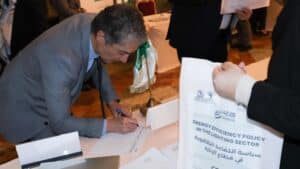 The workshop was convened against a background of the ongoing sustained increase in energy demand in Africa stimulated by population growth and economic development. This creates many challenges on the supply side, which is often marked by a limited electricity generation capacity, inefficient distribution systems, high fuel import costs, unstable energy supplies, low power availability and efficiency, and on the demand side some African regions have low levels of access to electricity and clean cooking solutions combined with the relatively low efficiency of electrical appliances across the continent.
The workshop was convened against a background of the ongoing sustained increase in energy demand in Africa stimulated by population growth and economic development. This creates many challenges on the supply side, which is often marked by a limited electricity generation capacity, inefficient distribution systems, high fuel import costs, unstable energy supplies, low power availability and efficiency, and on the demand side some African regions have low levels of access to electricity and clean cooking solutions combined with the relatively low efficiency of electrical appliances across the continent.
The main objective of the workshop was to share the energy efficiency policies developed in Tunisia in the framework of the Global Environment Facility (GEF)-funded Leapfrogging Tunisia’s Lighting Market To High Efficiency Technologies project, and to provide an opportunity for discussion on the different proposals developed to foster their implementation in other neighbouring countries. Country representatives and regional organizations took advantage of the workshop to showcase the advancements on their respective countries and regions. The ultimate aim being to develop national and regional markets of quality and efficient products through national actions such as strategic market transformation programmes and green public procurement measures, coordinated and harmonized at the regional and continental levels.
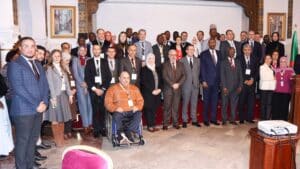 The three-day workshop kicked off on 19 December 2023 with an opening address by Mr Chabane Merouane, APRUE Director General, where he set the context for the event. “The economic and social development of the African continent faces multiple energy challenges that require better energy cooperation between African countries and regions. We consider that the development of an effective energy efficiency strategy is one of the important steps to strengthen this cooperation and transform it into concrete action plans with perspectives in line with the deep, rapid and structural changes in the global energy system.” He further stated that, “We must create adequate strategic administrative and institutional capacities, train men and women in the energy sector and enable countries to attract the necessary investments.”
The three-day workshop kicked off on 19 December 2023 with an opening address by Mr Chabane Merouane, APRUE Director General, where he set the context for the event. “The economic and social development of the African continent faces multiple energy challenges that require better energy cooperation between African countries and regions. We consider that the development of an effective energy efficiency strategy is one of the important steps to strengthen this cooperation and transform it into concrete action plans with perspectives in line with the deep, rapid and structural changes in the global energy system.” He further stated that, “We must create adequate strategic administrative and institutional capacities, train men and women in the energy sector and enable countries to attract the necessary investments.”
This was followed by presentations from Government representatives from Algeria, Tunisia and Ghana on their national projects for implementation of Minimum Energy Performance Standards (MEPS) and labelling for energy efficient lighting. In each case, they provided a summary of their policy and information on the challenges and lessons learned during implementation. This session was complemented by presentations by the Regional Center for Renewable Energy and Energy Efficiency (RCREEE), SADC Centre for Renewable Energy and Energy Efficiency (SACREEE), East African Centre of Excellence for Renewable Energy and Efficiency (EACREEE) and ECOWAS Center for Renewable Energy and Energy Efficiency (ECREEE) on their work on regional market mechanisms.
The day concluded with an overview of the new African Energy Efficiency Strategy (AfEES) and Action Plan, to explore and define the role of energy efficiency technology in the future energy mix of the continent, pledging to achieve a 50% increase in energy productivity by 2050, and with an overview on the strategic role of AFREC.
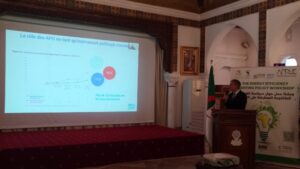 On the second day, members of the U4E team introduced the initiative and its integrated policy approach, as well as the international resources, tools and materials available to countries. The presentations revolved around the technical recommendations provided to Tunisia in terms of MEPS and Higher Energy Performance Standards (HEPS) for sustainable public procurement applications and key best practices for monitoring, verification and enforcement which could be replicated in the region. Information on the benefits and potential savings from market transformation towards more energy efficient lighting, cooling appliances (refrigerators and room air conditioners), industrial equipment (electric motors and transformers), buildings, data centres and solar PV equipment were also shared. Finally, an introduction to funding programmes to channel similar energy efficient programmes was presented.
On the second day, members of the U4E team introduced the initiative and its integrated policy approach, as well as the international resources, tools and materials available to countries. The presentations revolved around the technical recommendations provided to Tunisia in terms of MEPS and Higher Energy Performance Standards (HEPS) for sustainable public procurement applications and key best practices for monitoring, verification and enforcement which could be replicated in the region. Information on the benefits and potential savings from market transformation towards more energy efficient lighting, cooling appliances (refrigerators and room air conditioners), industrial equipment (electric motors and transformers), buildings, data centres and solar PV equipment were also shared. Finally, an introduction to funding programmes to channel similar energy efficient programmes was presented.
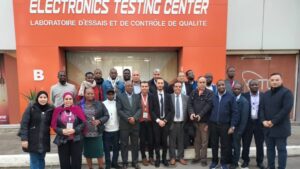 On the final day of the workshop, participants visited the Electronics Testing Center (ETC), a testing and quality control laboratory, in Boumerdes. The laboratory is approved by the Ministry of Commerce, and ISO-17025 accredited, and specializes in electronic and electrical testing and inspections, with particular expertise on the field of lighting and lamps. The participants received a guided tour of the facility, during which they learned more about the more about the protocols and equipment for testing lighting products to international standards.
On the final day of the workshop, participants visited the Electronics Testing Center (ETC), a testing and quality control laboratory, in Boumerdes. The laboratory is approved by the Ministry of Commerce, and ISO-17025 accredited, and specializes in electronic and electrical testing and inspections, with particular expertise on the field of lighting and lamps. The participants received a guided tour of the facility, during which they learned more about the more about the protocols and equipment for testing lighting products to international standards.
In his closing remarks for the regional workshop, AFREC´s Executive Director, Mr Rashid Ali Abdallah, stressed the increased effectiveness and value of countries working together to transition their markets to more energy-efficient products. “Through collective efforts and effective policies and strategies, together, African countries can achieve a 50% increase in their energy productivity by 2050, and a 70% increase by 2063, to ensure the long-term decoupling of economic growth from energy consumption, fostering energy-efficient and resilient economies, as well as realizing universal access to modern, reliable and affordable energy in support of the African Union Agenda 2063 goals.”.
The Strategic Partnership between AFREC and U4E aims to strengthen African countries by providing the right tools and expertise to transition them to an efficient energy sector by raising awareness of the benefits and promoting the establishment of a sustainable, efficient and inclusive energy system that benefits both the environment and the economy while ensuring universal access to energy.
For more information on the workshop and U4E’s projects in Africa, contact U4E’s Soledad Garcia at soledad.garcia@un.org. Alternatively, visit the Country & Regional Activities section of the U4E website where you can view information on all our projects.
Leave a Reply